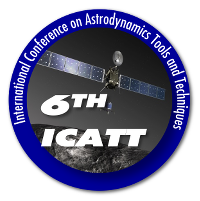Speaker
Marc Balducci
(University of Colorado at Boulder)
Description
Most methods of propagating orbit uncertainty assume posteriori Gaussian distributions, require an intrusive implementation or suffer from the curse of dimensionality associated with high-dimensonal random inputs. Although Monte Carlo techniques avoid these draw backs, the approach has a slow convergence rate. This paper considers the application of separated representations for orbit uncertainty propagation and discusses the theory behind their generation. The computation cost of a separated representation is largely linear with respect to dimension, thereby improving tractability when compared to methods that suffer from the curse of dimensionality. Generation of a separated representation requires the propagation of a small number of samples and yields an approximate solution, or surrogate, to a given stochastic differential equation describing the propagated orbit. This surrogate provides information on the moments and spatial density of possible solutions, as well as the sensitivity of the quantities of interest with respect to random inputs. This paper presents the case of spacecraft targeting an asteroid for a rendezvous, for which the initial conditions of each and the components of the interceptor maneuver are uncertain. Separated representations is used to estimate the probability of a successful rendezvous and analyze the resulting probability distribution functions.
| Applicant type | First author |
|---|
Primary author
Marc Balducci
(University of Colorado at Boulder)
Co-author
Mr
Brandon Jones
(University of Colorado)

